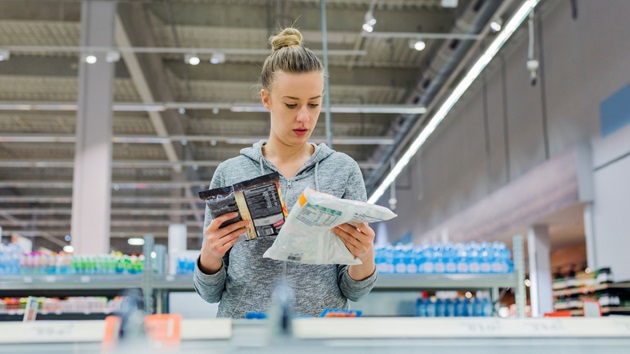I caught up with Manni Kalisperis, Procurement Category Lead - Seafood at Simplot Australia, who was recently awarded the prestigious MSC Lifetime Achievement Award at the Sustainable Seafood Awards Australia.
What does it mean to you to win the MSC Lifetime Achievement award?
I am humbled by the recognition, and as I said on the day, I haven’t dedicated my career to sustainability for awards but because it’s the right thing to do, and I want to see seafood enjoyed and available for generations to come.
I have always followed the mantra that “we are custodians at a point in time of the resources we use, and my personal goal is to leave the fisheries we rely on in a better shape than we found them”.
 Manni Kalisperis receiving his Lifetime Achievement Award. (Alex Webb, Anne Gabriel, Manni Kalisperis, Anita Lee, Rupert Howes)
Manni Kalisperis receiving his Lifetime Achievement Award. (Alex Webb, Anne Gabriel, Manni Kalisperis, Anita Lee, Rupert Howes)
It takes more than one person to drive change, and I have been privileged to work alongside a team of like-minded professionals over the years to improve the John West brand’s sustainability credentials.
Hopefully, recognition like this award will instil the same passion in the next generation of seafood professionals.
How is climate change affecting fisheries?
I believe that in the longer term, climate change will have a far more significant impact on fisheries than overfishing caused by fishing pressure.
Some species may disappear, but we can already see others growing, like the pink salmon fishery in East Kamchatka in Russia’s Far East.
What we do today will impact the longer-term health of our Ocean, and it feels like we are at this crossroads right now.
Why is it important to support fishing communities in remote communities?
Often the fish we consume comes from remote, isolated parts of the globe.
Taking the time to go out to these locations drives home how reliant these island and coastal communities are on the seafood that resides in their waters. It’s their primary source of income and often their primary food source.
Where does skipjack tuna come from?
I believe it is important to develop sustainable, balanced long-term commercial opportunities that support these remote communities whilst still providing commercially viable business solutions. Importantly, we need to support and not disrupt their primary food source, which is often the same species we target.
Why is it important to choose sustainable seafood?
Global production of seafood has increased fourfold over the past 50 years. The average per capita consumption of seafood globally has more than doubled, as has the world’s population and now we are experiencing significant growth in the middle class, particularly in South East Asia.
This is our current reality, meaning sustainability is becoming increasingly important and makes good business sense to embrace if we intend to continue catching, producing, and consuming seafood into the future.
Sustainable seafood has a relatively low impact on the planet and, if managed properly, is renewable for generations to come.
The good news, according to the Food and Agriculture Organization (FAO) of the United Nations, is that “about 79 per cent of seafood is sustainable”. I know this is a generic figure, but the point is that we are on the right path.
 80 millions cans of MSC certified John West tuna are sold each year in Australia
80 millions cans of MSC certified John West tuna are sold each year in Australia
The easiest way to make sure we are being responsible in our consumption of seafood and to ensure seafood for the future is to look for the MSC and ASC labels on pack. They are by far the most credible certification programs available and based on solid foundations linked back to the FAO guidelines for sustainability.
Should businesses wait for consumers to ask for sustainable products first before making the switch?
I believe the consumer expects that what they are purchasing is already sustainable. Most consumers find the whole topic of sustainability complex and confusing.
This is where we can simplify things by having more MSC and ASC-labelled products on offer in both retail and food service.
Most consumers may never understand what sits behind the MSC and ASC standards in the same way the industry does. However, the consumer understands enough to know that work has been done to be able to use the green and blue labels on pack.
You grew up fishing with your family in Williamstown, Victoria. What is your all-time favourite story?
My dad came to Australia in the late 1950s from a small Greek Island with little education and no fishing background. He fell into fishing and made a 50-year career out of it, and I just loved to go fishing with him from a very young age.
The summer school holidays were always the best times, and in the evenings before sunset, we would cast the gill nets for gummy sharks, and then we would fish with a hand line for King George Whiting (KGW) until it was time to pick the nets.
I have to say there is nothing more spectacular than a sunset on a balmy evening, sitting in a boat.
One evening we went to an outer reef to pick a bucket of mussels off the rocks for bait and collected half a dozen abalone for the following day’s lunch. This was quite normal some 30-40 years ago in Port Phillip Bay, and this reef was absolutely littered with mussels and abalone. Sadly, this is no longer the case.
We were fishing in a metre of water, and the fishing was red hot. Looking over the side of the boat, we could see a school of whiting numbering in the thousands milling around and feeding, and I thought to myself, how lucky are we to be able to enjoy
something so spectacular on our doorstep.
My dad is now 95 and still comes fishing with me. The whiting is making a comeback in the bay, and often we sit and recall the countless fishing adventures we have experienced.
I feel so privileged to have been exposed to the wonderful world of fishing at such a young age. To be able to turn your hobby into a career is about as good as it gets.
What’s your favourite seafood species and dish with the family?
I have so many favourite species both locally and globally, but I would say some pan-fried whiting and rock flathead fillets (lightly seasoned in flour and spices) served with a tomato, cucumber, red onion, and basil salad (all homegrown)—just magic.





